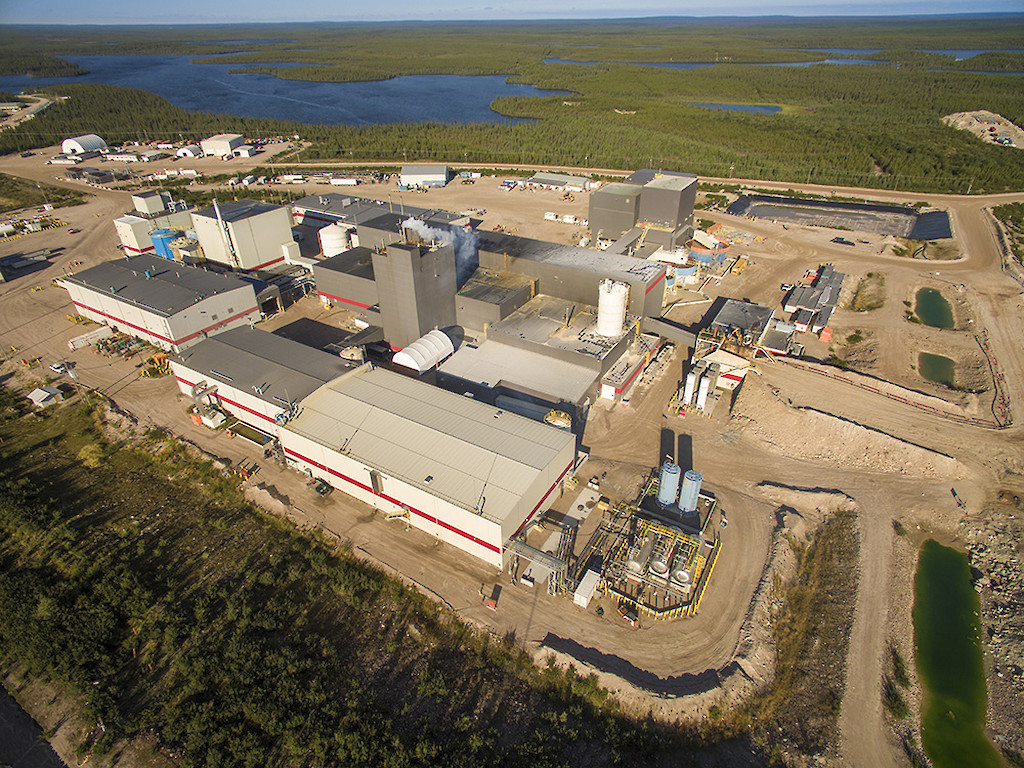Denison Mines JV approves restart of McClean operations, Saskatchewan

Orano Canada Inc. and Denison Mines Corp.’s [TSX-DML; NYSE-DNN] McClean Lake joint venture (MLJV) has approved a restart of uranium mining operations in the Athabasca Basin, northern Saskatchewan, using the joint venture’s patented surface access borehole resource extraction (SABRE) mining method. Orano Canada owns a 77.5% interest and is the operator of the MLJV and Denison owns a 22.5% interest.
Mining is planned to start at the McClean North deposit in 2025, with 2024 activities expected to focus on preparations necessary to ready the existing SABRE mining site and equipment for continuous commercial operations, as well as the installation of eight pilot holes for the first mining cavities planned for excavation. The approved budget for this work in 2024 is $7-million (100% basis).
Approximately 800,000 pounds U3O8 (triuranium octoxide) (100-per-cent basis) are targeted for production from McClean North in 2025, with approximately three million lb U3O8 (100% basis) identified for potential additional production from a combination of the McClean North and Caribou deposits during the years 2026 to 2030.
Jim Corman, Orano Canada’s president and CEO, said: “Our current ability to capitalize on the strengthening uranium and nuclear markets is the result of a long-term investment in R&D within Orano and the MLJV to secure continued activities at the McClean Lake operation well into the future. The groundwork we do over the course of 2024 is expected to put the MLJV in position to see SABRE in action and to commence production in 2025. It is anticipated that the McClean Lake mill will have sufficient capacity to process this ore, while continuing with committed planned production from Cigar Lake. It’s an exciting time for employees, partners and the industry as we return to a focus on growth.”
David Cates, Denison’s president and CEO, commented: “The restart of uranium mining at McClean Lake is a notable milestone for the MLJV and Denison. Mining at McClean Lake was suspended in 2008 in response to declining uranium prices. During the interim 15 years, the MLJV invested in the development of a proprietary mining method designed to selectively extract high-grade Athabasca basin uranium ores from surface. The successful mining test of the SABRE method in 2021 provided the MLJV with important information about the productivity and cost of SABRE operations. This information suggests an incentive price meaningfully lower than current uranium prices, which has provided the JV with a strong basis to make a restart decision for mining at McClean Lake.”
SABRE is the culmination of a mining equipment invention and development initiative that began in 2004 and concluded in 2021 with the completion of multiyear mining test program that successfully excavated approximately 1,500 tonnes of high-value ore. It is a non-entry, surface-based mining method that uses a high-pressure water jet placed at the bottom of a drill hole to excavate a mining cavity. The cuttings from the excavation process are then airlifted to surface, separated and stockpiled. SABRE is viewed as an innovative mining method that has the potential to allow for economic access to relatively small high-grade orebodies in the Athabasca basin that are either too small or too deep to be mined economically by conventional open-pit and/or underground mining methods.
The McClean Lake property is located within the eastern part of the Athabasca Basin region approximately 750 km north of Saskatoon. The mineral property consists of four mineral leases covering an area of 1,147 hectares and 13 mineral claims covering an area of 3,111 hectares.
. Denison has an effective 95% interest in its flagship Wheeler River uranium project, which is the largest undeveloped uranium project in the infrastructure-rich eastern portion of the Athabasca Basin region of Northern Saskatchewan. In mid-2023, a feasibility study was completed for Wheeler River’s Phoenix deposit as an in situ recovery mining operation, and an update to the previously prepared PFS was completed for Wheeler River’s Gryphon deposit as a conventional underground mining operation. Permitting efforts for the planned Phoenix ISR operation commenced in 2019 and have advanced significantly, with licensing in progress and a draft environmental impact statement submitted for regulatory and public review in October 2022.
Denison’s interests in Saskatchewan also include a 22.5% ownership interest in the MLJV, which owns several uranium deposits and the McClean Lake uranium mill, contracted to process the ore from the Cigar Lake mine under a toll milling agreement, plus a 25.17% interest in the Midwest Main and Midwest A deposits, and a 67.41% interest in the THT and Huskie deposits on the Waterbury Lake property. The Midwest Main, Midwest A, THT and Huskie deposits are located within 20 km of the McClean Lake mill.
Through its 50% ownership of JCU (Canada) Exploration Company Ltd., Denison holds additional interests in various uranium project joint ventures in Canada, including the Millennium project (JCU, 30.099%), the Kiggavik project (JCU, 33.8118%) and Christie Lake (JCU, 34.4508%).
Denison’s exploration portfolio includes further interests in properties covering approximately 285,000 hectares in the Athabasca Basin region.
